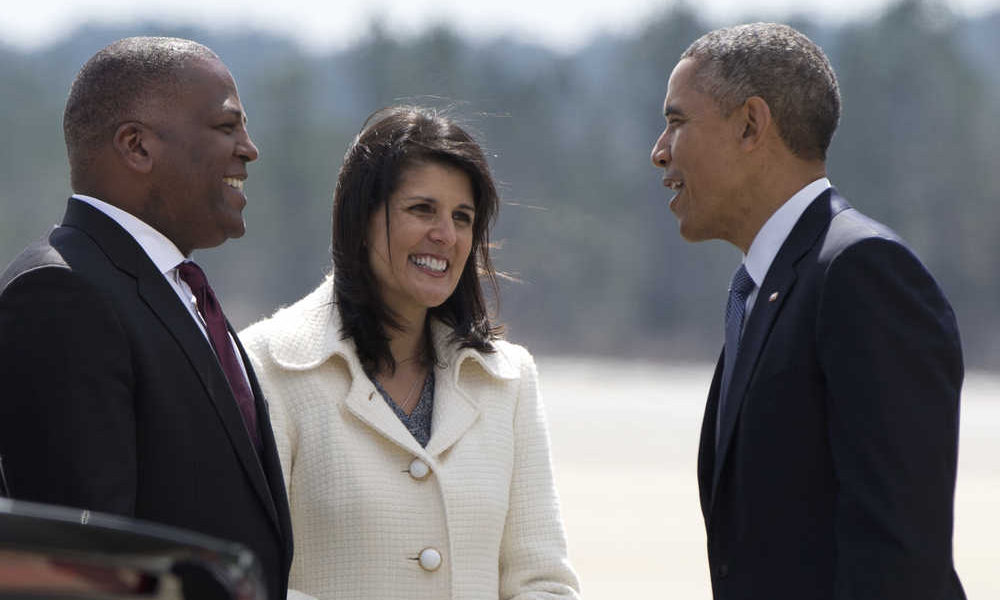
Nikki Haley, the U.S. ambassador to the United Nations, noted this week that there is mounting evidence showing that Iran is indeed arming Shiite Houthi rebels in Yemen in violation of the U.N. resolution that codifies the nuclear deal between the Islamic Republic and world powers into international law.
During a U.N. Security Council meeting on Tuesday, Haley identified the evidence as Iranian-manufactured anti-tank guided missiles, a drone known as a kamikaze unmanned aerial vehicle and SHARK-33 explosive boat material.
“All of these weapons, recovered from attacks and planned attacks on a G20 country [Saudi Arabia], were made by Iranian weapons industries tied to the Iranian Revolutionary Guard Corps,” said the U.S. ambassador.
“We have an opportunity to confront the Iranian regime for its actions that are clearly in violation of Security Council resolutions,” she added. “The international community must demonstrate that we are committed to ensuring accountability for the full spectrum of Iran’s malign behavior.”
Sunni Saudi Arabia and Shiite Iran are regional rivals fighting a proxy war in Yemen.
“This is the Secretary-General’s fourth report on the Iranian regime’s lack of full compliance with Resolution 2231,” also said Haley, referring to the U.N. resolution that put the nuclear deal into international law form. “And it is the most damning report yet. This report makes the case that Iran is illegally transferring weapons.”
In its fourth and most recent report on the issue, U.N. Secretary-General, Antonio Guterres cautions that Iran may be ignoring the international body’s call to stop developing ballistic missiles, adding that the United Nations is probing the Islamic Republic’s suspected transfer of weapons to Houthis in Yemen.
Jeffrey Feltman, the U.N. undersecretary-general for political affairs, highlighted steps the international body can take to pressure Iran into abiding by the nuclear pact, notes CBS News.
“Based on the violations of the Secretary-General’s report, there are a few options that we can use to put pressure on Iran to adjust their behavior: The Security Council could strengthen the provisions of Resolution 2231; We could adopt a new resolution that makes clear that Iran is prohibited from all activities related to ballistic missiles,” proclaimed Feltman.
In October, U.S. President Donald Trump refused to re-certify Iran’s compliance to the controversial nuclear agreement reached by the Islamic Republic and world powers led by the previous U.S. administration in July 2015.
Haley has accused Iran of violating the terms of the agreement, recently revealing what she described as “irrefutable evidence” that the Islamic Republic broke the rules by providing military assistance to the Houthi rebels in Yemen.
In his most recent report, the U.N. secretary-general “refers to debris from missiles fired by Houthi militants from Yemen into Saudi Arabia in July and November of this year … The inventory at the warehouse in Washington removes any shred of doubt that the missiles are from Iran.”
During a press conference in Washington, DC, last week, Haley presented what she described as recovered pieces of an Iranian-made Houthi missile fired from Yemen into Saudi Arabia in November.
At least since the Houthi takeover of the Yemeni capital Sanaa in late 2014, U.S. and Saudi Arabia officials have asserted that Iran has been arming the Shiite rebels.
In March 2015, the Saudis formed a U.S.-assisted coalition to combat the Houthi threat in neighboring Yemen and restore the internationally-recognized government of Yemeni President Abdrabbuh Mansour Hadi.
The Houthis in Yemen have repeatedly fired missiles allegedly built by Iran across the border into Saudi Arabia.
Houthis have also targeted the U.S. Navy in international waters off the coast of Yemen with missiles that allegedly originated in Iran.
Tehran has long denied the assertions that it is providing military support to the Houthis.
http://www.breitbart.com/national-security/2017/12/20/haley-most-damning-report-yet-confirms-iran-missiles-houthis-yemen/

